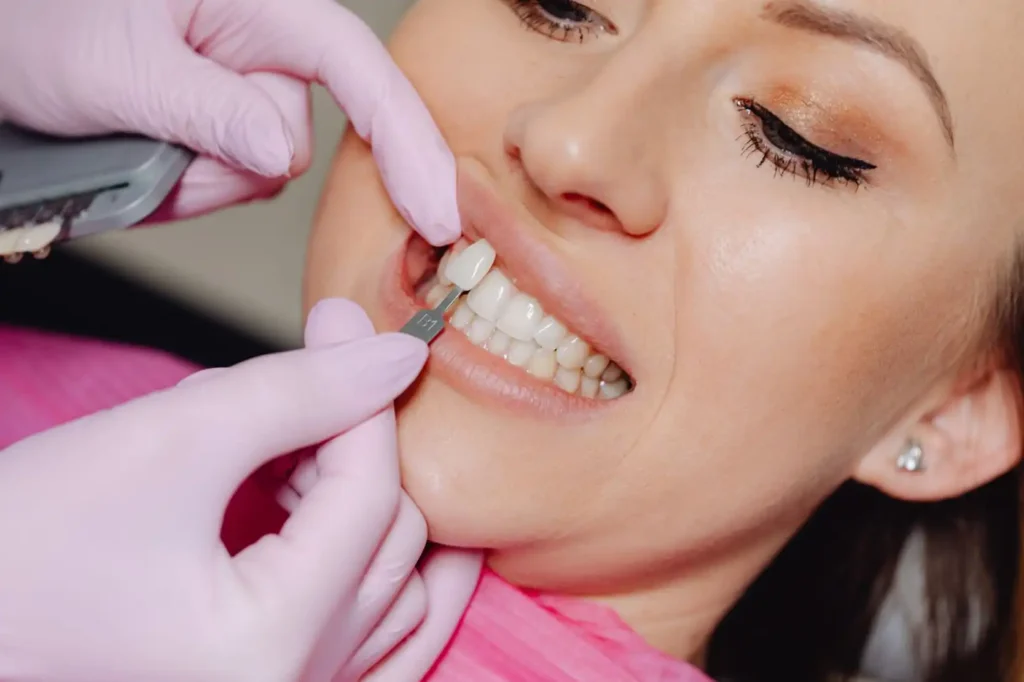Wondering does insurance cover veneers? Most dental insurance plans don’t cover veneers as they’re considered cosmetic.
Introduction to Does Insurance Cover Veneers:
When it comes to enhancing your smile, dental veneers are a popular choice. They offer a quick, effective way to cover imperfections like chipped, stained, or misaligned teeth. But while veneers can boost confidence and improve dental aesthetics, one question often arises does insurance cover veneers? The answer isn’t always straightforward, as coverage depends on various factors, including your specific insurance plan and the reason you need veneers.
In this blog post, we’ll break down everything you need to know about insurance and veneers. From understanding why insurance companies typically exclude cosmetic procedures to learning how you might get partial coverage under certain conditions, we’ll cover it all. Whether you’re considering veneers for cosmetic or medical reasons, this guide will help you navigate the insurance landscape confidently.
Why Dental Insurance Typically Doesn’t Cover Veneers:
Most dental insurance plans categorize veneers as a cosmetic dental procedure, similar to teeth whitening or orthodontic treatments done purely for aesthetic purposes. Since veneers are primarily used to improve the appearance of your teeth rather than address oral health issues, insurance companies often exclude them from standard coverage. Their focus is usually on preventive care (like cleanings and checkups) and medically necessary treatments.
Another reason for limited coverage is cost. Veneers, especially porcelain ones, can be quite expensive, ranging from $800 to $2,500 per tooth. Insurance companies aim to minimize expenses for procedures that are not essential for oral health, which is why cosmetic dentistry often falls outside the scope of coverage.
However, this doesn’t mean it’s impossible to get some financial help from your insurance provider. Understanding the nuances of your policy can make a significant difference.
Yes, you can appeal a denial by submitting additional documentation from your dentist to prove medical necessity.
Does Insurance Cover Veneers:
No, most dental insurance plans do not cover veneers because they are considered a cosmetic procedure. However, if veneers are deemed medically necessary due to dental trauma or structural issues, some insurance policies may offer partial coverage.

When Might Insurance Cover Veneers:
While insurance generally doesn’t cover veneers, there are exceptions. If veneers are required for medical reasons—for example, to restore teeth damaged by an accident, injury, or medical condition—some insurance policies might offer partial coverage. Always consult your dentist and insurance provider to determine if your situation qualifies for coverage under medical necessity clauses.
Here are scenarios where insurance might help.
- Trauma or Injury: If you’ve experienced a car accident, sports injury, or another traumatic event that damaged your teeth, insurance may classify veneers as a necessary part of dental restoration.
- Tooth Damage from Medical Conditions: Conditions like enamel erosion due to acid reflux or genetic disorders affecting tooth development might qualify veneers as medically necessary.
- Bite Correction or Structural Damage: In rare cases, veneers used to correct severe bite issues or restore tooth function could be partially covered.
How to Maximize Your Insurance Benefits for Veneers:
If you’re set on getting veneers, here are a few strategies to maximize your insurance benefits.
- Get a Pre-Authorization: Before undergoing the procedure, request a pre-authorization from your insurance company. This process can clarify whether any portion of the treatment will be covered.
- Detailed Documentation: Have your dentist provide comprehensive records, including X-rays, photographs, and a letter explaining the medical necessity of the veneers.
- Consider a Flexible Spending Account (FSA) or Health Savings Account (HSA): While insurance may not cover veneers, you can use pre-tax dollars from an FSA or HSA to offset costs, especially if veneers are medically justified.
- Explore Payment Plans: Some dental offices offer financing options, which can make veneers more affordable if insurance doesn’t cover them.
The Difference Between Cosmetic and Medically Necessary Dental Procedures:
Understanding the distinction between cosmetic and medically necessary procedures is key when dealing with insurance. Insurance companies are more likely to cover treatments that fall under the medically necessary category. Discussing your situation with both your dentist and insurer can help clarify potential coverage.
- Cosmetic Procedures: Aim to enhance appearance without addressing health-related issues. Veneers for teeth whitening or reshaping fall into this category.
- Medically Necessary Procedures: Required to maintain or restore oral health, function, or comfort. Veneers used to repair damage from trauma or severe decay could be considered necessary.
Three Popular Dental Insurance Plans For U.S. Citizens:
Here are three popular dental insurance plans for U.S. citizens that offer a range of coverage options, including preventive care, basic procedures, and in some cases, limited coverage for major dental work.
1- Delta Dental PPO: Delta Dental is one of the largest dental insurance providers in the U.S., offering extensive networks and flexible plans.[https://www.deltadental.com/us/en/protect-my-smile/dental-insurance-101/ppo-dental-insurance.html]
2. Cigna Dental 1500 Plan: Cigna is known for comprehensive dental coverage with competitive premiums and strong customer support.[https://www.cigna.com/individuals-families/shop-plans/dental-insurance-plans/cigna-dental-1500]
3. Guardian Direct Dental Advantage Gold: Guardian Direct offers flexible plans with a focus on preventive care and affordable premiums.[https://mydental.guardianlife.com/wp-content/uploads/2017/07/NH-Guardian-Advantage-UCR-PPO-Gold-v1.pdf]
FAQ
Most frequent questions and answers
No, veneers are rarely fully covered by insurance. However, if they’re deemed medically necessary—such as after an accident—partial coverage may be available.
Yes, you can appeal a denial by submitting additional documentation from your dentist to prove medical necessity. A detailed explanation can sometimes change the outcome.
Standard dental insurance plans typically do not cover cosmetic veneers. Some premium plans may offer limited cosmetic coverage, so it’s worth reviewing your policy or considering supplemental dental insurance.
Conclusion:
In summary, the answer to “does insurance cover veneers“ is generally no, especially if they’re for cosmetic purposes. However, if veneers are medically necessary due to trauma, structural damage, or medical conditions—your insurance might cover part of the cost. It’s crucial to review your policy, consult your dentist, and communicate with your insurance provider to understand your options. Even if insurance doesn’t cover the procedure, flexible payment plans or FSAs can help make veneers more affordable.







